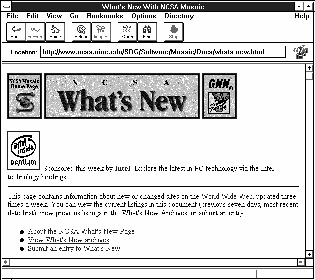
Figure 10-1 The "What's New On Mosaic" Page.
The author does not know the answer to these questions. Fortunately WWW is attracting the interests of lawyers, philosophers and artists who are starting to address these issues. Many of the papers which have been published address issues which affects WWW providers in the USA. The American Constitution, and in particular the amendment on free speech, means that much of the work published in the USA in this area is not relevant to the UK.
It could be argued that the contents of a WWW service are the responsibility of the organisation which runs the service. So if an undergraduate has been granted permission to publish information and publishes libellous information the University may be legally responsible. An editorial in the Times Higher Education Supplement suggested that if the organisation has published guidelines covering acceptable and unacceptable use the organisation will have a strong defence if a case is brought to law.
It is likely that any material which incites, encourages or enables others to gain unauthorised access to a computer system would be found illegal under this act.
Are pictures of naked women acceptable on a WWW service? It could be argued that similar guidelines which govern the contents of a university library should be developed for the WWW. Are pictures of naked women acceptable in books in the university library? The answer is probably "yes", especially if the university has a fine art department. Similar arguments could be made for textual pornography.
However even the most liberal individual is likely to be offended by some of the pornography which is believed to be available on the Internet. In addition UK legislation on computer pornography is likely to be introduced shortly. This could mean that universities have a legal obligation to concern itself with computer pornography.
Copyright, Designs and Patents Acts
In general the Copyright, Designs and Patents acts require that the permission of the owner of the intellectual property must be sought before any use of it is made whatsoever.
A WWW manager may have the responsibility to ensure that copyright materiel is not made available unless the copyright holder has granted permission. This may affect research papers which have been submitted for publication. It may also affect the use of photographs, drawings and maps, for which the copyright may be owned, for example, by the photographer or the organisation which commissioned the photograph.
Information about individuals which is available on WWW may have to be registered with the Data Protection Officer. The information provider may have to abide by regulations to ensure the accuracy of the information.
Equality Of Access To Information
WWW can provide global access to a wide range of information services. However including large logos and graphical icons on pages can act as a barrier to access to the information, especially for readers in developing countries with limited network access. In some developing countries access may be provided over local telephones lines. A health worker in a hospital in Africa who wishes to retrieve information about public health services may have to pay the additional costs in retrieving unnecessary graphics. If the local telephone company is owned by a multinational telephone corporation then accessing the information will result in a transfer of money from the developing country to the multinational corporation.
As shown in Figure 10-1 some WWW service providers have sponsors for their pages. Is this currently acceptable within the UK academic community? Should it be acceptable?

Figure 10-1 The "What's New On Mosaic" Page.
JANET Acceptable Use Policy
UK universities which make use of JANET (the Joint Academic Network)
must abide by the rules and regulations governing the use of JANET. The
following point should be noted.
JANET may be used for any legal activity in furtherance of the aims and policies of a connected organisation, subject to a number of rules. For example, the following uses are not permitted on JANET:
Formulating an institutional acceptable use policy for WWW information providers may not be a simple task. There are likely to be lively discussions over censorship and control. The formulation of the policy will be helped if the institution has a clear idea of what it expects from its WWW service. Is it:
An interactive document called Sex, Censorship and the Internet. is available at the URL http://www.eff.org:80/CAF/cafuiuc.html This document asks questions such as should universities carry alt.sex Usenet groups and should students be punished for using vulgarities on the Net. The document provides pointers to case studies.
Information about the Data Protection Act is available at the URL http://www.open.gov.uk/dpr/dprhome.htm
Andrew Charlesworth from the Department Law at the University of Hull has set up a Mailbase list for discussion of UK and European issues in Intellectual Property law, with special references to the impact of information technology and the Internet. To subscribe to the law-ipr Mailbase list send the message subscribe law-ipr firstname lastname to mailbase@mailbase.ac.uk
The CCTA Collaborative Open Groups (COGS) offers support for legal issues. Further information is available at the URL http://www.open.gov.uk/cogs/ To subscribe to a COG mailing list send the message subscribe mailid list to the address listserv@ccta.gov.uk For example J.Brown@leeds.ac.uk would send the msessage subscribe J.Brown@leeds.ac.uk legal to subscribe to the legal list.
Andrew Charlesworth, Director of the Information Law and Technology Unit at the University of Hull gave a presentation about the legal issues of the World Wide Web at a workshop on WWW A Strategic Tool for UK Higher Education\ held at Loughborough University in February 1995. His paper is available at the URL http://info.mcc.ac.uk/CGU/SIMA/WWW/legal.html
A list of URLs for the Codes of Practice and Guidelines for the establishment and continuing operation of UK H.E. academic WWW sites is available at the URL http://cspmserver.gold.ac.uk/guidance.html